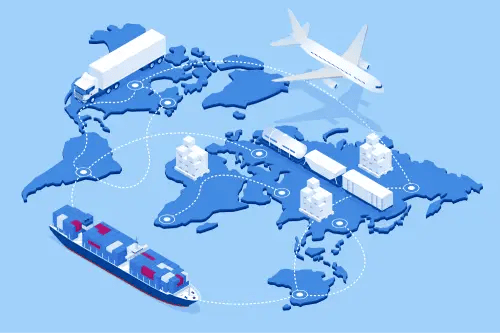
Intelligent automation (IA) combines robotic process automation (RPA) with advanced technologies such as artificial intelligence (AI), machine learning (ML), deep learning (DL), big data analytics, Internet of Things (IoT), Computer Vision, natural language processing (NLP), optical character recognition (OCR), intelligent character recognition (ICR) , task mining, and process mining to create end-to-end business processes that think, learn, and adapt on their own. Intelligent automation is sometimes referred to as intelligent process automation (IPA) and hyper-automation.
Though IA can be applied across any sector, this paper focuses on its impact and applications across the healthcare and telecom sectors, and the supply chain function.
The healthcare industry has been catapulted into transformation with speed and agility as core drivers. Speed and agility will produce powerful outcomes, including greater patient engagement, enhanced capabilities, and increased care quality in terms of cost efficiency, revenues, and return on capital. Permanent structural changes must be made to sustain speed and agility in ways that will inspire and engage employees and reshape talent.
Healthcare revenue cycle management (RCM) is the financial process used by healthcare facilities to manage the administrative and clinical functions associated with claims processing, payment, and revenue generation. The process consists of identifying, managing, and collecting patient service revenue including the full process of billing and payment that takes place in the healthcare facilities. Some view RCM as the process from patient visits to claims payment. However, the process is far broader than that: RCM begins before the patient is seen and doesn’t end until long after.
Once the basic components of the revenue cycle model are in place, automation can be used in numerous ways to improve upon processes, decrease delays in accounts receivable (A/R), and increase revenue. Healthcare companies are currently leveraging the UiPath platform to increase speed and agility by automating human system navigation and processing to:











The deployment of 5G technology is revolutionizing the telecommunications sector. Telecom companies are adopting end-to-end intelligent process automation (IPA) tools to improve business operations and prepare for the impact of 5G and other networking technologies. Mass-market 5G coverage is expected to increase greatly in 2023. 5G will create significant business opportunities for telecom companies but will also strain their resources and infrastructure. RPA can alleviate this strain in network operations and the call center.
Artificial intelligence (AI) is essential for telecom’s digital transformation and for analyzing data on the network. It can help with automating the network, personalizing information for users, converging systems, and organizing data. An integration with other applications and platforms, including digital assistants and chatbots, provides an opportunity to gain insights into customer preferences for better service and product offerings.
Internet of things (IoT) can help improve the operational efficiency of telecom providers with remote equipment monitoring and management. A majority of telecom providers see IoT as an important driver for expanding services. Intelligent automation can help them see where workflows or processes are underperforming or even broken, and enable them to be proactive about fixing them.
Telecom firms are interested in delivering content directly to consumers. They have been partnering with or buying companies that produce television shows, movies, and live sports events. Intelligent automation solutions can pull data and gather real-time analytics on customer preferences to help them create more targeted content.
The telecom industry has reached a significant technology milestone. Instead of depending on human workers to run business processes, providers are implementing a new form of collaboration, pairing employees with intelligent process automation—a combination of RPA, AI-ML, and IoT to automate telecom processes end-to-end.






In an ever-evolving and technologically advanced world, businesses are faced with meeting changing consumer preferences and environmental uncertainties. As the market place develops, processes and procedures within the enterprise must adapt to changing market demands. Many of the adaptations that help businesses stay competitive fall under the supply chain and operations function. Modern supply chains help improve living standards by enabling consumers to buy essential, quality products at lower cost. This is because an effective supply chain streamlines the process of getting products to market faster and cheaper
Intelligent supply chain solutions, based on the digital enablers such as process mining, task mining, RPA, intelligent document capture (IDP), (IoT), AI-ML, and big data analytics create the foundation for a high-performing, lowcost supply chain by addressing the following businesses challenges:





Efficient management of supply chain operations is crucial for an enterprise amidst ever-changing trends, regulations, and customer demands. Implementing intelligent automation solutions helps drive higher efficiencies across the supply chain by optimizing it through improvements in time, quality, and transaction costs. It helps enterprises save costs and therefore unlock capital for highvalue and strategic initiatives.









Thus, intelligent automation technologies such as RPA, AI-ML, Computer Vision, NLP, and IoT contribute to advancements in Industry 4.0 and the smart operations megatrend by enhancing operational efficiencies, cost savings, and new revenue streams.
With Cyient’s RPA and intelligent automation solutions using the UiPath platform, businesses can ramp up automation to counteract growing labor and inflation pressure, push their automation boundaries, and embrace IA as the enterprise’s new way of operating and innovating.
Cyient (Estd: 1991, NSE: CYIENT) is a consulting-led, industry-centric Global Technology Solutions company. We enable our customers to apply technology imaginatively across their value chain to solve problems that matter. We are committed to designing tomorrow with our stakeholders and being a culturally inclusive, socially responsible, and environmentally sustainable organization.
For more information, please visit www.cyient.com
Follow news about the company at @Cyient
Prakash Narayanan is Solutions Head for RPA and intelligent automation at Cyient. He has over 24 years of experience in the field of IT and has delivered 1000+ bots across sectors such as banking, pharmaceuticals, and telecom, and has extensive experience in intelligent process automation tools and platforms. He was among the Top 16 Global Automation Rockstars picked by Dynamic CIO magazine in 2022.
Cyient (Estd: 1991, NSE: CYIENT)delivers Intelligent Engineering solutions for Digital, Autonomous and Sustainable Future
© Cyient 2024. All Rights Reserved.